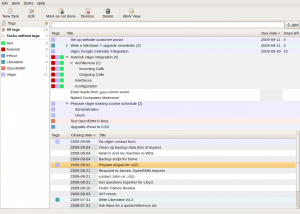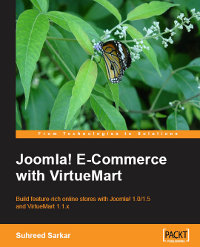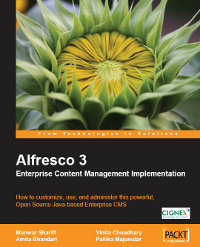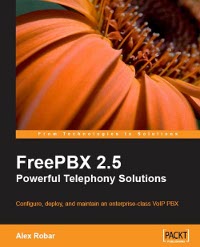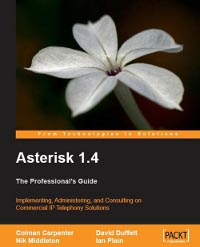More book reviews and what I’ve been up to…
I just noticed that I hadn’t posted anything here for what feels like ages – since August the 15th.
So I thought, hmmm, better write something.
But what? A quick update on what’s been going on perhaps? That’ll do…
I’ve been working quite a bit with the brilliant free and open source vtiger CRM recently. Looking at some of the less widely used features and updating our training materials for the recent 5.10 release. I’ve also just submitted a small patch for the Customer Portal feature, to do with its web layout and have been thinking about how best to improve this, and the Webforms modules, to make them easier to customise.
I am also really enjoying using a great little python application called “Getting Things Gnome“. It one of those simple applications which does one job, does it very well and is easy to use. It’s basically an app for jotting down your todo list and making sure you get things done… Here’s what it looks like on my Ubuntu Jaunty desktop:
I also had a mail from those nice people at Packt Publishing suggesting two new books to look at and review for them, In fact a co-author of one of them actually requested that Packt contact me to do a review 🙂 Flattery indeed.
So, we now have four books in the pipeline in no particular order:
Implementing, Administering, and Consulting on Commercial IP Telephony Solutions
- Written by four Asterisk Professionals, this book brings their years of experience together in an easy-to-understand guide to working with Asterisk in small, medium and larger Commercial environments
- Packed with hints, tips, and best practice – learn to avoid the pitfalls that can hinder an Asterisk implementation
- Focused chapters provide thorough, comprehensive, and self-contained instructions on how to deploy Asterisk across different commercial scenarios
This will probably be the first one I read when they arrive next week. It’s hot-off the press, just been released and can be ordered from Packt’s web site here.
My little Asus 1008HA netbook is running very happily with the Alpha build of Ubuntu Karmic Koala. I was at the swimming pool yesterday (not in it but taking my son to his lesson) and using 3G mobile internet to get on line. Battery life is good although not as long as is quoted by Asus. I reckon I get about 3 1/2 to 4hrs of good use. But that is mainly when powering a 3G dongle too – and they get hot. Karmic is shaping up to be a great release I think although to be frank I am really not sure about the new Gwibber interface, and the Empathy IM client hasn’t really floated my boat yet. But hey ho, never mind, at least we have a choice folks.
We are planning some new marketing activities over the coming months, what with the forthcoming release of the best desktop OS of all time and Microsoft releasing their rewrite of Vista, October should be a fun month. Hopefully we’ll have lots of interesting stuff to write about.
In fact I want to share with you a backup script I’ve written in Bash for my home office network and what may well end up being expanded and developed to support some of our commercial systems too. Well I think it’s pretty cool anyway. It wakes up machines in the middle of the night, uses – currently – rsync to back them up, then turns them off again. Configuration is easy and it seems to be working fine. When I get a mo I’ll publish the script source and let you all comment on my terrible bash skills. But I like it…
So there!
Update on Miserware Beta – Power Saving on Linux
It’s well over a week now since I started using the Miserware MicroMiser software. I have it installed on all the Ubuntu PCs we have at home and on two laptops too. I have noticed no adverse effects from running the software. In fact you really do forget it is there. (The Micromiser software is packaged and available for easy install on Debian and it’s many derivatives, Fedora, RHEL, and SLES too so you are not limited to just Ubuntu’s Linux)
When I’m travelling around London (as I did quite a bit this week) I tend to take my 10″ webbook netbook device as it is lightweight and easy to cart around. For comms, I have a 3G dongle that gives me Internet access from virtually anywhere. [Ask Daviey just how handy that was the other day 😉 ]
Now, this is by no means a scientific result and I haven’t had time to actually do a proper comparison with and without the Miserware code, but I reckon I’m getting around 30mins more life from the battery since running the Micromiser software. Before installing the code I was getting between an hour to an hour and a half or so of battery life, so I guess that that would equate to an average improvement of around a third.
Those 3G devices get really hot after being on for an hour! They make a really nice hand warmer in the winter though 😉 My lappy is running Ubuntu 9.04 desktop.
The Beta trial is still active and running and Miserware are very happy to have more subscribers sign-up. So If you would like an invite, leave a comment here and I’ll get on it asap.
One point that came up from a couple of people who were interested in taking part in the trial was to do with some restrictions on what you could say publicly about your observations. I am happy to say that Miserware have updated the license to be a little clearer and allow for more information disclosure. Here’s the text of the mail (with obfuscated email address) I received regarding the changes:
Dear MicroMiser beta participant,
Thank you for your involvement in the MicroMiser beta! The response so far has been tremendous and well beyond our expectations. The information we are getting when you run the mw-feedback script is really helping us improve our products and documentation.
The license you agreed to when registering for the beta said you needed permission from MiserWare to publish data reported by our software. We would like to lift this requirement to some extent by allowing you to share performance and power numbers reported by MicroMiser. More precisely our lawyers told us to say it like this:
“You are hereby authorized to disclose information regarding the performance of the MicroMiser software, provided that such information is provided to you in a MicroMiser software report.”
This includes any information (including energy savings information) provided by MicroMiser in any of its log files and/or information reported in tools such as the mw-feedback script which reports system specific information to MiserWare thereby aiding future development and earning you points in the incentive program.
Several folks have asked about benchmarking against other power management software. With regard to benchmarking, we want to clarify the intent of the license. Our intent was not to preclude benchmarking altogether, but to ensure the measurement methodology is fair to all parties. More precisely, our lawyers told us to paste both permissions together:
“You are hereby authorized to disclose information regarding the performance of the MicroMiser software, (i) provided that such information is provided to you in a MicroMiser software report, or (ii) provided that such information is obtained using techniques approved in writing by MiserWare.”
There is no need for you to sign another license agreement as these clarifications simply give you additional permissions under the original license.
These clarifications are the result of your feedback. Please continue to send your comments to f–db–k at miserware dot com . We promise to keep listening.
Regards,
MiserWare
So, if you want to help these guys with their Beta, and get on the incentive program too (I’ve just won and received a really cool green iPod Nano) simply leave me a short comment below.
Say hello to the webbook
We don’t often talk directly about our business activities on this blog. But once in a while something happens that rightly deserves a mention.
Our Open Source consulting business, The Open Learning Centre, has been very busy of late. We’ve been working with a household name hardware manufacturer and a very well known high-street retailer to deliver a really exciting and innovative product to the consumer market.
Say hello to the webbook (click for a very big image).
The webbook is manufactured by the UK electronics company Elonex and is being sold exclusively by The Carphone Warehouse.
The webbook is a high specification UMPC that has a 1.6Ghz Via C7 processor (x86), 512Mb of RAM and [currently] an 80G HDD. The screen has a very usable 1024×600 resolution and it has the usual assortment of USB, LAN and an SD socket, plus built in WiFi too. We have setup a blog specifically for the webbook here so users can get access to all the latest news, tips and advice. Be sure to add it to your feed reader.
The really cool thing about the webbook is the software. The webbok comes pre-loaded with Ubuntu 8.04.1, Hardy Heron, and some new software written especially for this application that delivers broadband connectivity over 3G Mobile networks.
With Ubuntu you get pretty much everything you will ever need included right out-of-the-box. You don’t need to go out and pay several hundred pounds to get legal copies of a word-processor, spreadsheet and email client. The webbook comes pre-installed with the fantastic OpenOffice.org applications suite and the Evolution mail and calendaring client. Web browsing is provided by the most excellent Firefox 3 and there are many more high quality and fully functional applications provided on the hard disk. A couple of examples are The Gimp for photo editing and Pidgin for Instant Messaging. Of course you also have access to Ubuntu’s on-line software repository where there are literally thousands of other programs and applications to choose from. And they are all free and are not “demo” or limited functionality versions either. Open Source gives you freedom, not restrictions.
The 3G communications software called Wader (GPL licensed, and funded by Elonex) was written by Warp Networks of Zaragoza, Spain. Their knowledge of this specialised area of communications technology and Python programming is superb and the chaps did a fantastic job to get the software ready for production in what were ultimately very tight time-scales. We have plenty of plans for new features and enhancements, and as the software is open source, community involvement is welcomed and encouraged. We will be communicating more on how to get involved shortly.
For anyone interested in Mobile Broadband, or just getting their mits on a webbook for that matter, the proposition from Carphone Warehouse is very attractive indeed: simply take out a contract (with Carphone Warehouse) for 3G Mobile Broadband with either Orange, T-Mobile or 3 and you get the webbook for free! Or, you can just buy the webbook outright. If you are in the UK, there’s probably a webbook near you now. They are available on-line or from their many high street shops.
Our role in this was to work with Elonex to get the right software packaged and delivered on time to Carphone Warehouse. We introduced Elonex to Canonical in London (now can you guess where I am?) who are the commercial enterprise behind the world’s most popular Open Source Operating System, Ubuntu. We orchestrated the 3G development track with Warp Networks and carried out testing as the code was being produced. And we coordinated and managed the packaging and development of the software bundle as a whole.
Here’s the other side of the webbook:
